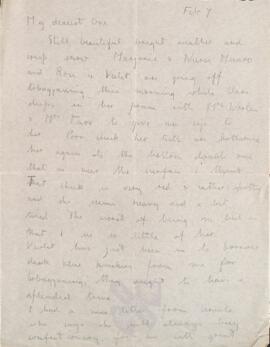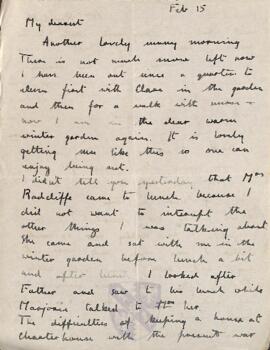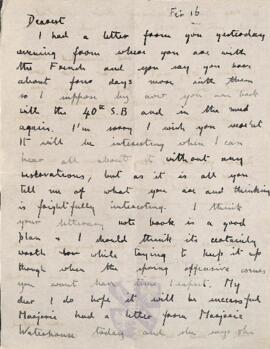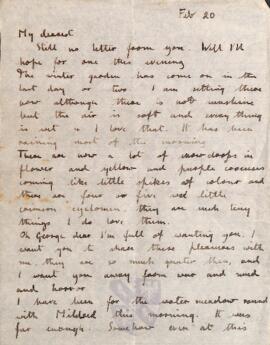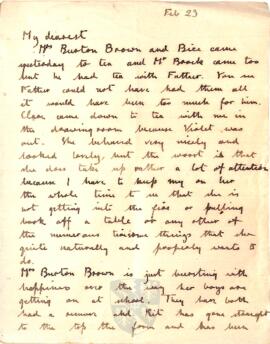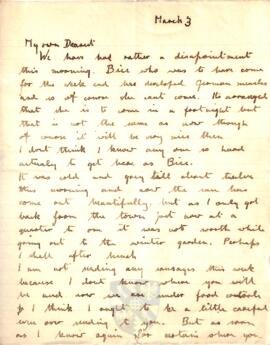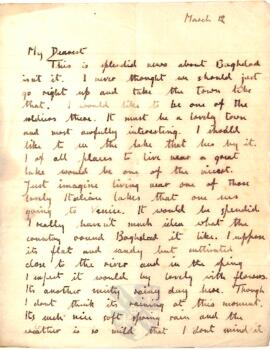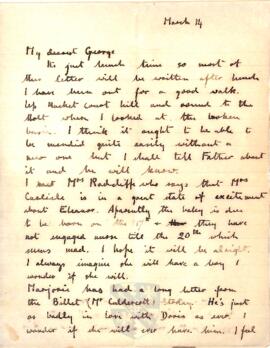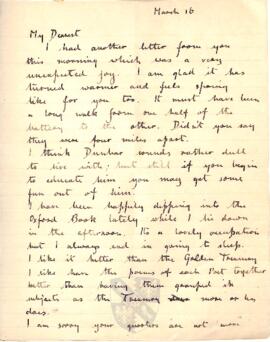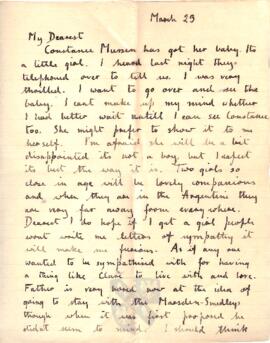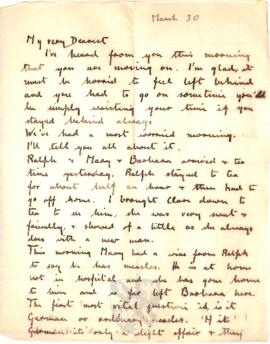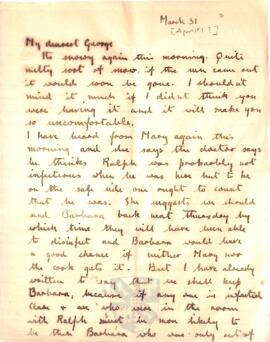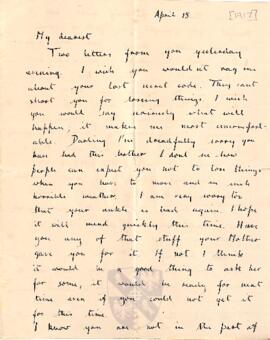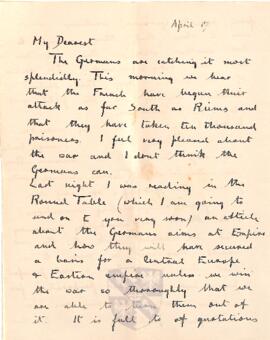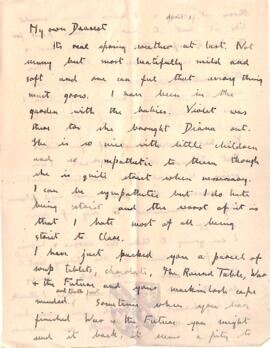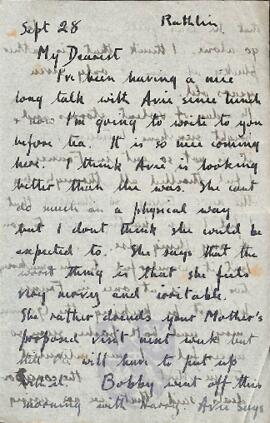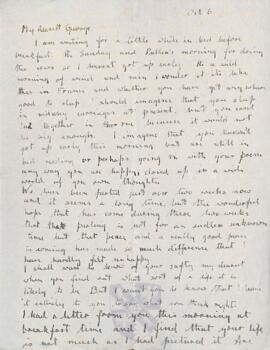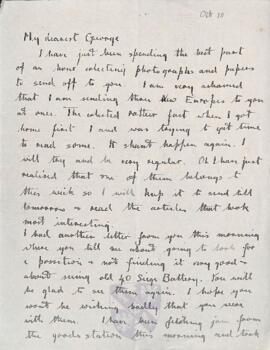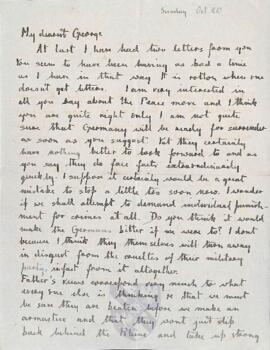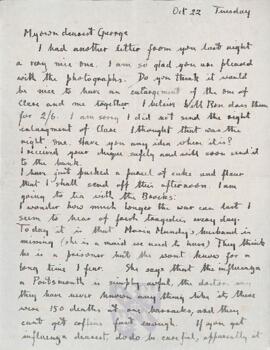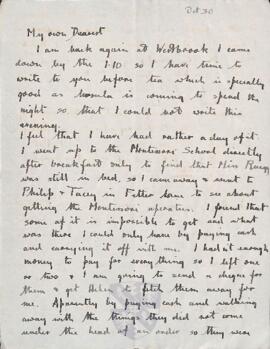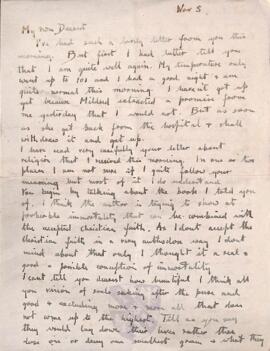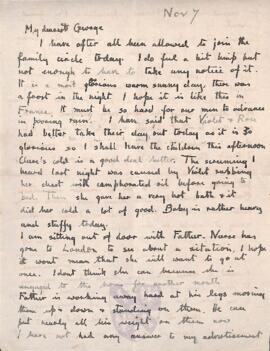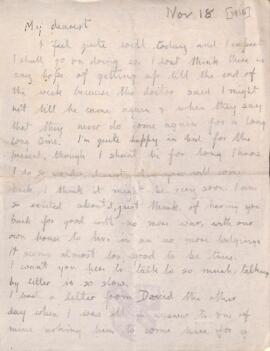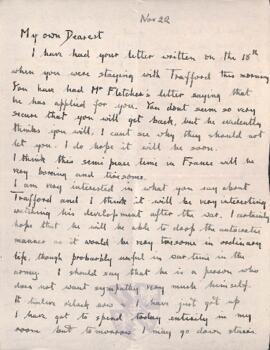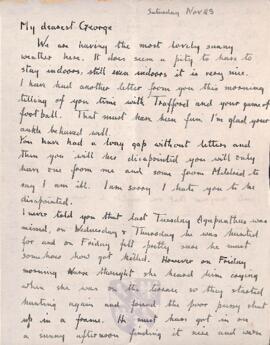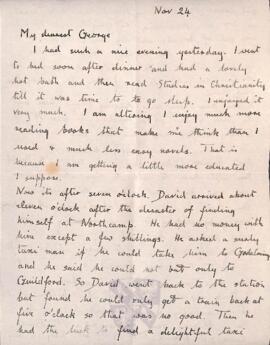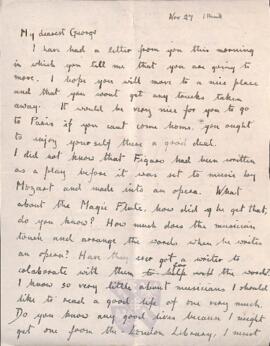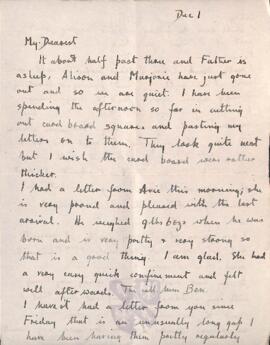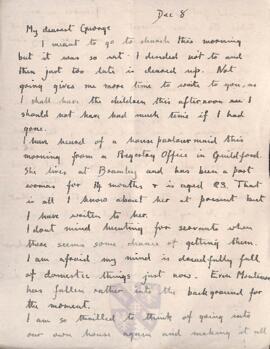Updates him on Clare's progress. Tells him she has heard from Ursula. Describes a conversation with Constance Mussen. Discusses food rationing. Expresses her opinions of Boswell's writing.
Describes the weather and the previous day's activities with Mrs Radcliffe. Describes in detail a conversation with Mrs Radcliffe about the financial costs in running Charterhouse. Updates him on her health and on Clare's progress.
Acknowledges his letter and hopes that he can keep his literary notebook up to date. Tells him that Marjorie Waterhouse is busy preparing the hospital for the spring offensive. Expresses her wish for the war to be over and her love for him. Discusses in detail her thoughts about Mr Britling's conception of God. Describes Clare playing. Informs him of the items she is sending him including his war saving certificates. Updates him on her improving health.
Describes the weather, the gardens, and the walks she has been going on with Mildred. Tells him about goose hunting in the canoe. Discusses how she prays for different people.
Describes in detail the conversation at tea with Mr and Mrs Burton Brown. Updates him on Ursula's sisters' health. Describes the weather. Expresses her opinions about the extracts from his note book. Asks him to send her more extracts. Expresses her fear for the coming Spring offensive.
Tells him that Bice has German measles and has postponed her visit. Informs him that she will stop sending him parcels until she knows where he is located. Tells him that Mary has accepted her invitation to stay when Ralph departs. Expresses how much she misses him. Discusses the progress of the war. Hopes for another letter from him soon.
Expresses her thoughts on the taking of Baghdad and what it would be like to live by a river. Describes the weather and playing with a makeshift slide with Clare. Hopes to receive another letter from him. Tells him that Clare is the next best person to be around when he's not there.
Describes her walk to the Holt and a conversation she had with Mrs Radcliffe. Tells him about a letter Marjorie received from Mr Caldercott and relays news about Mary Anne organising Diana's stay. Informs him that there is still German measles at Charterhouse. Updates him on Clare's progress and tells him about Clare's new appreciation of music. Acknowledges the parcel he sent to her. Tells him she is sending him pictures of Clare. Updates him on her health.
Acknowledges and discusses his last letter. Discusses reading the Oxford Book and compares it to the Golden Treasury. Is happy to hear that his new location is an improvement. Discusses the progress of the war and financial matters. Updates him on her pregnancy progress and tells him about attending Baby Welfare group.
Tells him that Constance Mussen has had a little girl. Hopes that she wont be sent letters of sympathy if they end up having another girl. Describes the weather and the parcels she is sending. Hopes to have another letter from him soon. Discusses her opinions about how rich people have been affected by the war. Tells him about a job position Marjorie is considering. Discusses the progress of the war and when it will end.
Acknowledges his last letter. Describes in detail how Ralph has measles and expresses her concern for everyone's health. Reflects on how different their life is now and what their life might be like when he is home. Expresses her irritation at having to rest in the afternoons.
Describes the weather. Tells him about the situation regarding the visitors and German Measles. Compares baby Barbara with Clare and describes how they get jealous of each other. Updates him on Clare's progress. Updates him on everyone's news. Expresses her love for him. Describes the mothers at Baby Welfare group.
Acknowledges his last letter and expresses her concern for the repercussions of him losing the secret code book. Advises him to use the product his mother sent him for his ankle. Expresses her concern for his safety and her happiness that he is set up well in his new location. Tells him he must be careful at his observation post. Updates him on Clare's sleeping routine. Describes the flowers in the garden. Discusses Owen and Mary Anne's relationship. Asks him what he would like sent to him.
Discusses the progress of the war and an article she read in The Round Table. Tells him about a visit to Abbots Hospital in Guildford on an errand for her father. Discusses when the war might end.
Describes the weather and Violet's relationship with children. Tells him what she has sent in his parcel an asks him to tell her what he thinks of the new items. Reflects on past times together. Expresses her opinions about the Ottoman empire and different types of punishment. Expresses her wish for him to be home.
Describes her conversations with Avie about his mother coming to visit her. Discusses the progress of the war and the moves made for peace. Describes Avie's children and hopes they can all holiday together after the war. Sends him his parents' and Avie's love.
Describes where she is writing from and asks him about the weather in France. Reflects on how long they have been apart and expresses her happiness that the war might end soon. Informs him she has just received a letter from him. Discusses in detail the contents of his letter and asks him questions about his living arrangements. Expresses her opinions about helpfulness and religion. Describes a visit to the Harvest Festival at Church. Thanks him for writing to her and asks him if he wants a picture of her.
Informs him of the parcels she is sending him. Acknowledges his recent letter. Tells him about the horde of jam they have stored. Describes the items they all bought in London and the bedtime routine with the children. Expresses her opinion about the point of marriage. Tells him about a neighbour receiving the news that her son is missing in France. Discusses the terms of peace.
Expresses her happiness at receiving letters from him. Discusses in detail the progress of the war and peace talks. Expresses her gratitude that he has not been affected by shell shock. Expresses her opinion about fighting from the air. Describes a conversation between herself, her father and Olive about the leisure provisions for working men after the war and how to close the class divides. Tells him how she would like to meet the man Olive is engaged to.
Asks him if he would like enlarged photographs of herself and Clare and tells him about the parcel she is packing for him. Informs him that a former maid of theirs has heard that her husband is a prisoner of war and brings her news of the Spanish Flu in Portsmouth that has taken 150 lives so far. Discusses her father's and Mr Pilcher's ideas of Mr Clutton-Brock's book. Discusses the progress of the war. Tells him she intends to stay in London to visit two Montessori schools and her plans for visiting Doris and the British Library.
Discusses her plans to set up the Montessori class. Expresses her thoughts on his opinions about spiritual life. Describes how she feels about his friend Will and tells him about Will's recent accident and illness.
Updates him on how she is feeling with influenza. Acknowledges his letter about religion. Expresses her opinions about divine love and quotes extensively from War and Peace. Describes in detail her thoughts about religion and their different opinions of it. Discusses the progress of the war. Tells him about an anecdote from Parliament. Ask him to write essays on religion.
Updates him on all their health and recovery from influenza. Discusses her plans for the Montessori classes. Expresses her opinions on how and when to teach Clare about religion. Discusses the progress of the peace talks and tells him about her days activities.
Updates him on her health. Expresses her impatience to have him home. Tells him she has heard from David and updates him on his news and news on Jelly. Informs him of a meeting she wants to attend called the Young Wives Association but can't because she is still too ill. Discusses financial matters surrounding the Montessori classes. Tells him of the local poor population that have died with the flu and the books she has been reading. Expresses her anxiety that Violet might leave.
Acknowledges his last letter and discusses Trafford's character and how he might get on after the war. Apologises for him not receiving any parcels while she was ill with influenza and tells him the contents of his next parcel. Expresses her anxieties over starting the Montessori class and the slowness of the postal service. Discusses how to give the appropriate amount of time to the children and their plans for moving back to the Holt.
Describes the weather. Acknowledges his letter stating he was playing football with Trafford. Tells him about the cat getting stuck in the door. Expresses her worries over not being ready to teach the Montessori classes. Describes her conversations with Mary Anne when she came for tea. Informs him that David Pye is coming to visit. Discusses what servants they will need at the Holt. Expresses her opinions about Mary Anne's Young Wives Fellowship group. Expresses her opinions about how to introduce religion to children.
Describes her previous evening's activities. Describes in detail David Pye's arrival and the troubles he encountered getting there. Updates him on David's news. Informs him that Jelly is coming to play at Charterhouse and expresses her wish to go. Updates him on Clare and Berry's progress. Discusses asking the O'Malley's to move out of the Holt in early January.
Acknowledges his letter telling her he is being moved. Discusses her thoughts on Figaro and the process musicians take to create music for a play. Expresses her disappointment with the second Montessori book. Tells him she will send him Mr Clutton-Brock's book. Expresses her thoughts in detail on the grace of God. Tells him she is sending his flour and asks if his letters will be forwarded to Paris.
Expresses her impatience that he is not home yet. Tells him he has received an electioneering address and discusses who she would vote for if she were able, and discusses politics in detail. Expresses her opinions about the articles written in The New Europe about the German and Russian revolutions. Describes tea with Mr and Mrs Osgood and her afternoon at the baby welfare group. Tells him about a cook that has advertised in the Surrey Advertiser. Expresses her wish to be with him in Paris.
Tells him she did not go to church and that her mind is occupied with finding servants. Reflects on what their life will look like at the Holt. Informs him of her intention to hear Mr Clutton-Brock speaking for Labour and her plans to stay in London for a few nights. Tells him she is feeling tired and updates him on her father's health. Describes how Clare has been pretending he is home.
